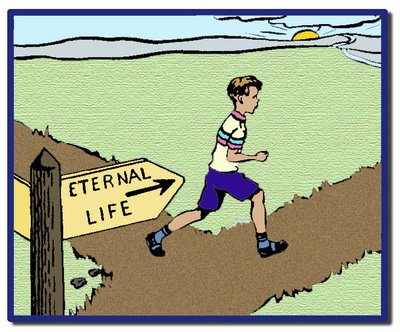Let the Lord Open Your Eyes

The 30th Sunday in Ordinary Time
Today’s Readings: Jer 31: 7-9; Ps 126; Heb 5: 1-6; Mk 10: 46-52
The gospel today tells us that as usual, a large crowd was mobbing Jesus and his disciples as were leaving another city—this time Jericho. We’ll never know if Bartimaeus, the blind man who was sitting on the side of the road, was waiting for Christ to pass by… or if it was just another routine day of begging for handouts from travelers going down the road.
But when the blind man heard through the noisy commotion that Jesus, the remarkable healer, was passing in front of him, he knew that his life could change forever. In a flash, Bartimaeus seized his once-in-a-lifetime opportunity with gusto as he began to shout out again and again: “Jesus, son of David, have pity on me.”
The crowd was annoyed and tried to hush him. But the man cried out all the more. He had nothing to lose and everything to gain. He could not and would not be silenced.
Jesus heard Bartimaeus’ cries for mercy and stopped. He halted in his tracks and came to a complete standstill. Over the din of the crowd, Christ heard the man’s voice of blind faith. His persistent shouts touched his compassionate heart. Even though lots of people were competing for his attention, Jesus focused on this one blind man like a laser beam. I can just see the Lord’s eye penetrating deep into the man’s soul as he asked him with love and concern: “What do you want me to do for you?”
Bartimaeus eagerly blurted out his deepest wish: “Master, I want to see.” Jesus immediately granted his desire. It was a miracle beyond all miracles. I love how the gospel says that the man followed Jesus on his way. I’m sure he couldn’t take his eyes off his generous benefactor, memorizing every detail and gazing deeply into his wonderful face.
The story of Bartimaeus helps us see Jesus with eyes of faith. Even before Christ stopped in his tracks, the blind man had seen him more clearly than all the people in the crowd who had their eyesight. How could this be? Maybe through his other God-given senses, the man had learned to listen and hear with great alertness and attentiveness… and as a result, his physical disability had taught him spiritual wisdom and discernment. Bartimaeus’ faith in the divine healer was not a foolish or reckless or stupid faith. Even before Jesus stopped, he was thoroughly convinced that Christ could help him.
There are two great lessons that we ought to take away with us today.
First, we should never forget that God has great compassion and mercy for us. We’ve all gone through times when we feel blinded by doubt, despair, sorrow, disillusionment, hate, confusion or exhaustion. But Bartimaeus teaches us how even in that blindness, we can have a clear vision of God and his love and goodness. Just the way that Jesus stopped and listened so compassionately to the blind man, he will also halt and listen to our own cries for help. We should be comforted and strengthened and filled with great hope knowing this. Remember the little dialog and don’t be afraid to use it. You say: “Lord Jesus, have pity on me.” He stops, looks at you and you alone, and says: “My beloved, precious child… what do you want me to do for you?” Then you simply tell him.
And the second great lesson today is that we should never be afraid to stand up and shout out to the Lord. The crowd wanted Bartimaeus to just shut up and act like a blind man or beggar is “supposed” to. But he refused to go along. He wasn’t going to be put down and marginalized. He would not let other people tell him that he wasn’t worthy to speak to Jesus because of some characteristic in his life! We should passionately remember Bartimaeus’ example. Yes, he was physically challenged, but the people who tried to prevent him from reaching Jesus were themselves in need of a spiritual healing. As we all know, there is much of that in our society today. Look how people are cast aside because of race, gender or sexuality, ethnicity or immigrant status, religion, class, wealth, ability or other divisive criteria. As Catholics, it is vitally important that we stand up and advocate for others who are marginalized—and not get caught up in the hoopla and hysteria of those voices who just wish that some people should just go away. And by the way… this is a great lesson to reflect on as you prepare to go into the voting booth and mark your ballots a week from Tuesday.
We pray that we can see Jesus with new eyes… with the beautiful clarity of vision that Bartimaeus had. And may those eyes of faith fill us with compassionate love for all our brothers and sisters.



